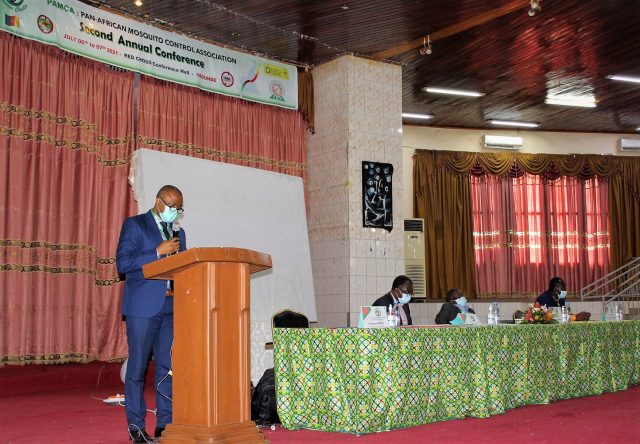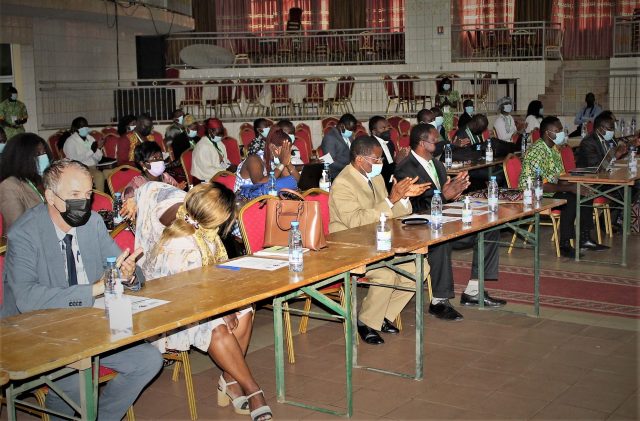This annual meeting did not go unnoticed. With the participation of more than ten researchers from the Centre for Research in Infectious Diseases (CRID), the event was marked by a great success.
Incredible! As in 2021, Yaoundé, the capital of Cameroon hosted the second annual conference of PAMCA-Cameroon. The conference took place at the Red Cross Conference Hall and ran from 6th to 7th July, 2021. The theme: “capacity building for integrated control of vector-borne diseases” guided the discussions throughout the event. This edition of the conference took place in a rather particular context due to the current global health crisis caused by the Covid-19 pandemic. It is however a time for researchers to critically reflect on their daily actions, the quality of research carried out, the ways in practicing science and the possible changes associated with potential advances. Dr Antonio-Nkondjio Christophe, President of PAMCA-Cameroon speech during the occasion was marked by a call to all researchers to be models of hard work, commitment and scientific rigor in the scientific community in Cameroon as well as in Africa. His statement highlights the urgent need to pave the way for the next generation. “We need to raise awareness around us and always convince others that no situation is permanent in this world. We must be optimistic by always reinventing our way of thinking, working, living, and our interaction with others in order to create a better world” noted Dr. Antonio-Nkondjio Christophe, whose vision is close to the perception of Peter Drucker who argued that “the best way to predict the future is to create it.”

Apart from the aforementioned situation, Prof. Charles Wondji, Executive Director of CRID, noted that “around one billion people fall sick each year. Several million of them die from diseases such as malaria, sleeping sickness, yellow fever, filariasis, Dengue, Zika; etc. which are transmitted by insects. This situation, as we know, considerably slows down the economic growth of developing countries”. In an effort to highlight the importance of such a conference, the Executive Director of CRID remind that “the need for expertise in vector control remains high particularly in sub-Saharan Africa which is however the region of the globe where most people are affected by vector-borne diseases. Yet, there is little emphasis on the central role of vector control in interrupting the transmission of these diseases in order to achieve elimination goals”: Being conscious of the fact that winners find ways and there is more happiness in giving than in receiving, Prof. Charles Wondji makes a solemn announcement that overwhelmed stakeholders at the meeting: “CRID intends to work hand in hand with PAMCA Cameroon to promote the central role of vector control in the management and elimination of vector borne diseases in Cameroon and Africa as a whole”. It is worth recalling that, many CRID researchers already play a major role within PAMCA Cameroon either as members or administrators. “Concerning the future, it’s not about predicting it, it’s about making it possible.” This statement by Antoine de Saint-Exupéry is in line with the aspirations of CRID and its partner PAMCA who are preparing to organize in August, a capacity building training workshop for district-level health staff on malaria entomology surveillance in Cameroon.

A total of 122 participants took part in this conference. They came from 8 institutions and 7 universities. Students at CRID did not come home back empty-handed. They received 4 of the 9 awards of the event. Binyang Jérôme Achille received the 3rd prize for best oral presentation; Ngannang Brigitte received the 1st prize for best Poster presentation; Ngongang Sonia received the 1st prize for best oral presentation and the 2nd prize for “my thesis in 180 seconds” presentation. All stakeholders felt upgraded at the end of this conference which is probably an indicator that the second annual PAMCA-Cameroon conference was a great success. The best is yet to come. The third edition of this conference will take place in 2022 and may be organized in Douala, the economic capital of Cameroon. Now researchers are telling themselves; this is an event you shouldn’t miss!






